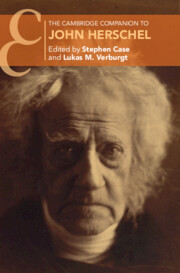Book contents
- The Cambridge Companion to John Herschel
- The Cambridge Companion to John Herschel
- Copyright page
- Contents
- Figures
- Contributors
- Acknowledgments
- Chronology
- Introduction
- 1 John Herschel
- 2 The Mathematical Journey of John Herschel
- 3 John Herschel’s Astronomy
- 4 Stargazer at World’s End
- 5 Herschel’s Philosophy of Science
- 6 Drawing Observations Together
- 7 Photology, Photography, and Actinochemistry
- 8 Herschel’s Planet
- 9 John Herschel and Scientific Standardization
- 10 John Herschel and Politics
- 11 John Herschel’s Methodology in the Scientific Community
- Further Reading
- Index
9 - John Herschel and Scientific Standardization
Published online by Cambridge University Press: 08 May 2024
- The Cambridge Companion to John Herschel
- The Cambridge Companion to John Herschel
- Copyright page
- Contents
- Figures
- Contributors
- Acknowledgments
- Chronology
- Introduction
- 1 John Herschel
- 2 The Mathematical Journey of John Herschel
- 3 John Herschel’s Astronomy
- 4 Stargazer at World’s End
- 5 Herschel’s Philosophy of Science
- 6 Drawing Observations Together
- 7 Photology, Photography, and Actinochemistry
- 8 Herschel’s Planet
- 9 John Herschel and Scientific Standardization
- 10 John Herschel and Politics
- 11 John Herschel’s Methodology in the Scientific Community
- Further Reading
- Index
Summary
Precise measurement and the production of accurate standards was at the very heart of John Herschel’s conception of science. This was not only true of his own endeavours, including those astronomical, but was fundamental to his philosophical vision of scientific practice, as well as his theological understanding of nature and God’s role in Creation. Throughout his career, Herschel contributed to several standardizing projects, including the production of units of weight, distance, time, musical pitch, volume, and even the harmonic division of musical notes. In the one full-time position of paid employment that he occupied, as Master of the Mint, he was responsible for regulating the nation’s standards of bullion and coinage and, in his role as a trusted scientific advisor to the British government, he promoted standardized practices for global investigations of natural phenomena, including those astronomical, metrological, and magnetical. To establish accepted units of measurement and standardizing regimes brought order to philosophical inquiry, regulation to the nation and empire’s economic activity, and organization to diverse societies around the world. In his promotion of worldwide investigations into natural phenomena through standardized observation techniques and disciplined observatories, Herschel ensured that the cultivation of nineteenth-century natural philosophy was inseparable from the wider proliferation of empire: science was a tool of British imperialism, providing knowledge on a global scale and bringing together colonial territories in the pursuit of new understandings of nature. By the time of his death in 1871, few had done more than Herschel to facilitate accurate measurements of nature; and given that precise measurement was increasingly to define scientific practice throughout the nineteenth century, his standardizing efforts were remarkable in their influence. Crucially, however, Herschel was implicit that knowing nature through accurate measures and with standardized units was, in itself, of intrinsic moral value: to count molecules, weigh matter, and record the order of celestial motions was to know God and understand the universe that He had created.
- Type
- Chapter
- Information
- The Cambridge Companion to John Herschel , pp. 209 - 230Publisher: Cambridge University PressPrint publication year: 2024

